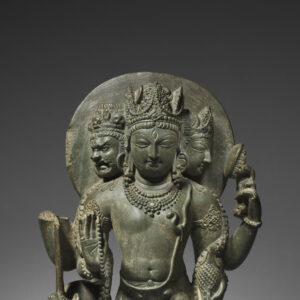A man goes to a spiritual teacher and is told, “God is inside every living being.” Thrilled with this new knowledge, the fellow walks home repeating to himself, “God is inside all beings, God is inside all beings, God is inside…” Suddenly startled from his reverie, he hears someone yelling, “Look out! A wild elephant is stampeding down the road. Move away or you’ll be trampled!”
Forcing himself to remain still, he concentrates on God being inside of the elephant and refrains from running away. The elephant comes charging down the road, coming closer and closer to our stationary hero. Then, at the critical moment, the elephant doesn’t pause at all, it tramples right over him.
The man, battered and beaten, returns to the spiritual teacher and complains, “You told me God was inside every being. I looked for God inside the elephant. Why was I trampled?” The teacher replied, “Looking for God in the elephant was very good. But you failed to heed God in the form of the person who told you to run away.”
Relationships don’t work. That’s the bad news or the good news, depending on how you look at it. Relationships don’t work when they are given an assignment they can’t fulfill: that of making us feel complete. The failure of relationships may appear as bad news because we experience pain when they end. The fact relationships fail is actually good news, because this highlights the futility of trying to attain happiness outside ourselves. The failure of relationships can serve as a fierce, but effective reminder that the peace and positive energy we seek must be found within.
Many of us have had the experience of meeting someone and falling headlong into infatuation with their poise, radiance, and beauty. After a few dates, or perhaps a few years, we can hardly believe that our Prince Charming or Princess Bride turns out to be, actually, not much more than an imperfect human being. At that point, we have a choice. We can accept responsibility for our erroneous perceptions and expectations, forgive the other for being more like ourselves than we care to admit, and get to work on clearing the garbage that prevents us from experiencing love. Or, we can imagine that the problem is due to the fallibility of the other person, and we can condemn that person ’til the cows come home in order to justify our righteous, negative opinion.
The world reflects back to us our attachments and selfish desires. A man buys a new car and is proud as punch. He washes it and protects it from scratches, dents, and dogs who might pee on the wheels. Then he sells the car to his neighbor. Now he doesn’t care what happens to the car. Did anything change about the man or the car? No, only his idea of ownership and how this supported his sense of identity.
When this idea of ownership, and its accompanying ego support, arises in relation to other living beings, problems inevitably follow. When we identify with a certain person or group with whom we feel a kinship, we end up excluding others. We establish a circle of compassion in our minds in which we agree to squeeze in so many and no more. This is why we can sleep at night while people are starving to death, but we get upset when much less critical problems befall our family or friends.
When we form cliques, we limit our willingness to experience relationships and, therefore, to know love. For love is not love until it is complete, whole, and universal. In the heavenly choir, everyone’s voice is essential, and each has a note to sing, without which there is no whole. To exclude anyone from the circle of heaven is to misperceive the nature of divine love, which is, in a very deep sense, all for one and one for all.
There’s currently a lot of talk about community. People are longing for a sense of connection to their family and neighbors. Much of this is an intelligent search for a more practical way to live. Seeking community has a rub because we’re still stuck in a pattern of looking to others to provide the remedy for the dissatisfaction we feel. Beginning with an inner sense of lack, we seek that which will make us complete. When we cannot find it in people or objects, we become frustrated.
This dissatisfaction, ultimately, cannot be solved by rearranging people or things in our lives because it has its roots in the spiritual realm. Our personal unhappiness is the manifestation of our inability to relate to the Divine within, and our social malaise is our collective inability to relate to the Divine in each other. Our feelings of separation from others are the reflection of a deeper feeling of separation from God.
The potential for the right relationships arises when we get to the essence of community — communion. Communion is a blending of consciousness, a surrender of individual ego identities in a space of spiritual devotion. Communion comes when we are willing to purify our minds and hearts so that we no longer project our attachments and selfish desires onto others. This means taking responsibility for our anger, judgments, and grievances, and releasing these negative emotions through forgiveness and compassion.
With communion, life grows from a constant struggle to get what we want and avoid what we detest, to an increasingly graceful dance of relating to God in life’s various situations. In a spirit of unity, we seek to perceive the one Divine Being who resides in all hearts. In a spirit of diversity, we seek to honor the dance of relationships by interacting and relating to others in a healthy and appropriate manner. We learn from spiritual teachers, run from wild elephants, and pray, dance, sing, and have as much fun as possible with the other members of our human family.




